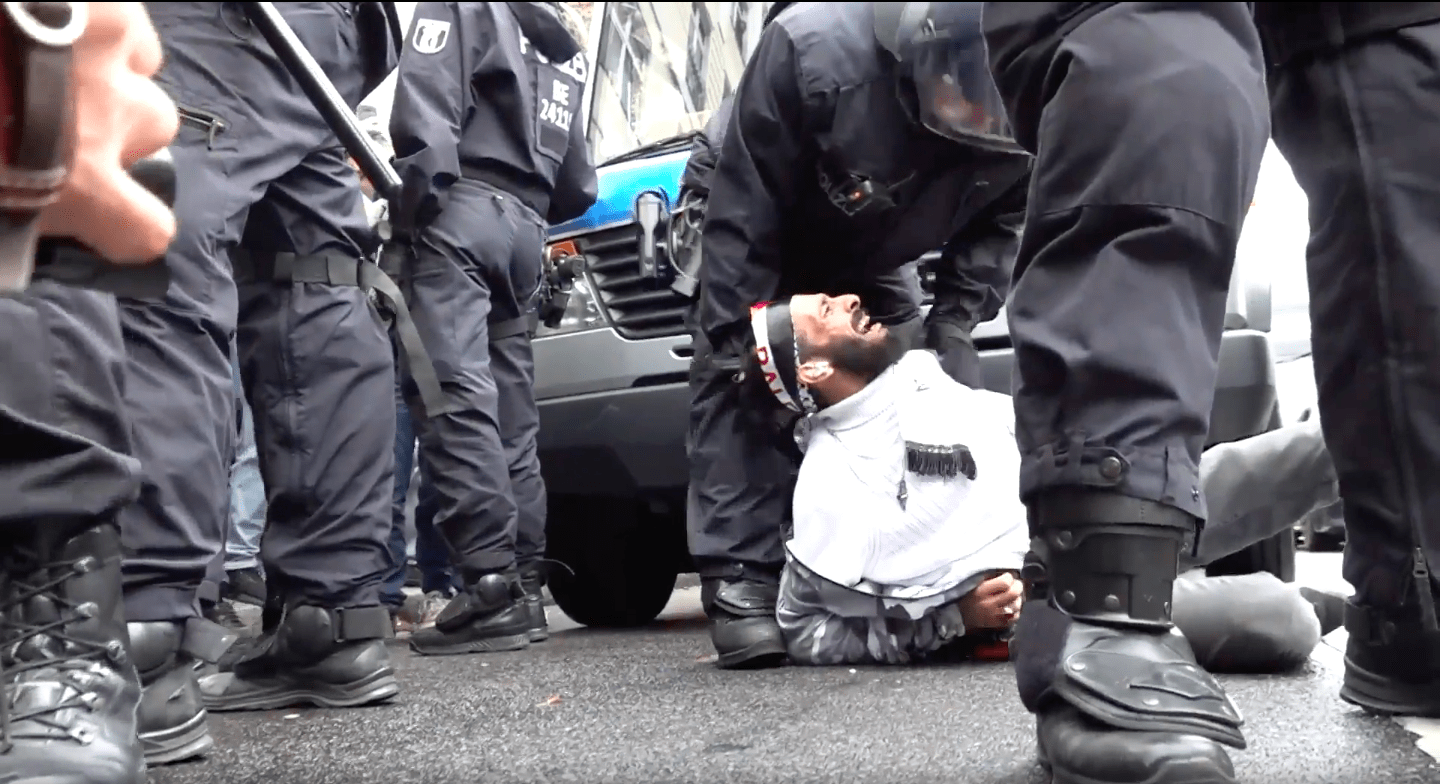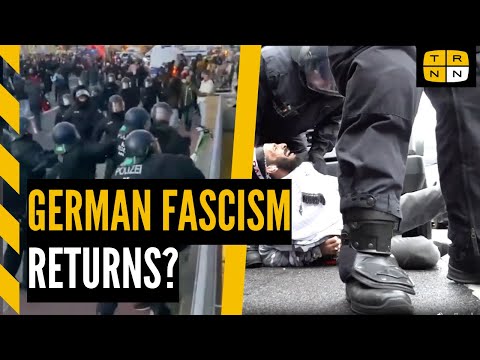Western governments are cranking up repression of pro-Palestine activists in response to the outpouring of solidarity with Palestine by millions around the globe. In Europe, Germany has set a grim bar in brutalizing protestors and violating their civil liberties. The Real News reports from Berlin’s largely Arab and Muslim Sonnenallee neighborhood.
Producers: Belal Awad, Leo Erhardt
Videographers: Dan Avram, Arne Büttner
Video Editors: Leo Erhardt
Transcript
(Narrator): As Israel continues to subject besieged Gaza to a brutal bombing campaign, variously described as war crimes, ethnic cleansing and genocide Western governments have lined up in support of Israel whilst attempting to dampen solidarity with Palestine. No country, though, seems to have aligned itself as unequivocally with Israel than Germany.
On the streets of Berlin, a city famous for its ‘anything goes’ attitude. This unwavering support of Israel has translated into harsh and unprecedented police repression. Sonnenallee, a street in the predominantly Arab and Turkish neighborhood of Neukölln is known by the Arab community as Share’ al-Arab or Arab street.
Zaid, Activist: Sonnenallee is the street with all the Arab shops and Arab people and migrants in general, they are very
I mean, this is also Hermannplatz.
(Narrator): Zaid Abdulnasser is the coordinator of the Germany chapter of Samidoun an international solidarity network for Palestinian prisoners.
He’s also a Palestinian refugee and resident in Germany since 2015.
Zaid, Activist: I would say in every demonstration and every event that happened for Palestine in Berlin ever since the seventh of October, in every event, there was an incident, at least one where the police attacked the demonstration and hit people and assaulted them and arrested at least a couple of people.
Some of the harshest repressions took place, last week happened here, and they closed that street and they blockaded it with tens of police vans, and, and police officers, like hundreds of police officers, were roaming the street here, and they built some sort of desk to process the people.
(Narrator): One of the people processed at these desks was sociologist and activist Mattanja, who says she was walking home when she was arrested.
Mattanja, activist: They just drove me two blocks and dropped me off over there in this street on Hermannplatz, where they created a pop-up police station.
They really put down tables and everything because they were arresting so many people that day. And there was a line with people, maybe like 100 people, women, men, ten year old kids after me, a ten year old boy got arrested, worked to the floor, sat on his neck. He was standing behind me in line over there.
(Narrator): In a video that quickly went viral, Mattanja is seen being arrested by police. “I am arrested because I said ‘free, free Palestine’”
Mattanja, activist: On that day there were like two protests scheduled here in Neukölln that were banned immediately. Those protests were on two different squares here in the neighborhood. I was just there on the sideline like watching other people getting kettled and arrested. And then actually I was on my way home to where I live and passing over Sonnenallee there were like a lot of people and some people said: “Free, free Palestine.” I chanted “Free, free Palestine” twice while walking home on a street where there was no demonstration planned. And I sat down at a table and 2 seconds later, five police cops ran at me and said: “You’re arrested.”
(Narrator): Of course, the police are acting on orders from higher up.
Olaf Scholz, German Chancellor: It is very important to say this today here in Israel during these difficult times: Germany’s history and responsibility it had for the Holocaust requires us to help maintain the security and existence of Israel.
(Narrator): Activists claim that police repression, criminalization, and institutional silencing of Palestine solidarity goes way back to before October the 7th. With the recent events representing only an intensification.
Nevertheless the drive by many in Germany to express solidarity to mourn, to protest against occupation and genocide seems not only to persist but to grow.
Crowd chanting: “Free, free Palestine!”
“Stop the genocide!”
“Cease fire now!”
(Narrator): Iris Hefets is an activist in Germany’s ‘Jewish Voice for Peace’. On October 14th, she was arrested and detained for holding a sign in public reading:
‘As a Jew and Israeli stop the genocide in Gaza.’
Civilian: Iris Hefets from the ‘Jewish Voice’ detained the Berlin police detained Iris Hefets on Hermannplatz.
Iris Hefets, Activist: Yeah, if someone is here offended by the fact that I’m criticizing Israel it can be considered to be anti-Semitic. This is the perversion of Germany, of anti-Semitism. And we see now, of course, that it’s a big problem, because if everything is anti-Semitism, then nothing is anti-Semitism.
Anna, Protester: Of course anti-Semitism exists, but Palestinians and Arabs still have the right to go on the street, show their support for the people mourn also and this has been completely, since one month, forbidden in the name of anti-Semitism, which is actually racism against Arabs and Muslims within Germany who is a huge part of the population also.
Lorin, Protester: By silencing a democratic protest you’re just gonna divide more people. They actually get to the opposite result that they say they want to achieve.
Samantha, Protester: Supporting this idea that to oppose the state of Israel is to oppose Jews this causes anti-Semitism this is an extremely dangerous mystification. People have the right to protest and suppressing the right to protest is only going to actually increase anti-Semitism.
(Narrator): As well as arresting people for expressing an opinion, since the 7th of October, videos have surfaced showing German police attacking protesters, stamping out candles at candle-lit vigils, ripping away Palestinian flags and simply stopping and searching people who are even suspected of being part of a demonstration.
Mohamed Al Hassan, is the manager of a law firm representing many of the protesters who have been arrested at the demonstrations since October 7th.
Mohamed Al Hassan, manager of Advocardo: At the moment we have women, young women, girls, basically girls who are beaten up very badly up into hospital. So they have black eyes. They have broken bones, broken ribs. So people people were completely beaten up and we have to say that some people were even beaten up after they were taken into the police cars. So they were handcuffed already. And they totally got beaten up. And we are filing cases against the police as well.
Samantha, Protester: The police… I never feel safe when the police are nearby, and I don’t think they are here to protect us, they are here to enforce the German State’s perception of Palestine as an anti-Semitic cause and it’s outrageous and dangerous.
Crowd chanting: “Eyes open, eyes open!”
“Our children are being lost!”
Zaid, Activist: But what happens when you apply this amount of repression and pressure against Palestinians and Arabs and even internationals who support Palestine, where you ban them, from gathering legally and voicing their worries and voicing their feelings and voicing their political position.
What this resulted in is that the street at some point refused this repression, so like even in a sense of if I were the state and I was concerned about my inner security, it is very dangerous to alienate hundreds of thousands of people in this very brash and very repressive way and if anything, it does show that, fascism never left Germany. Fascism is still alive and well in Germany.
Iris Hefets, Activist: If Germany says that in order to do a ‘never again’, they are supporting genocide, that is really a perversion of the Jewish history, of the history of all humans. The Holocaust is not only Jewish history.
Therefore, I am here to say, of course not in my name. Of course, I condemn deeply what Germany is doing.
Mattanja, activist: I think it’s very important for people all around the world to become aware of how German propaganda the media outlets have no shame in twisting the most like basic basic observations.
(Narrator): One of Germany’s largest media corporations, and one of the largest media publishers in Europe, Axel Springer, outlines its core “values” on its website. The first value mentions “democracy and a united Europe” while the second “the right of the existence of the State of Israel.”
Their flagship tabloid Bild is the highest-circulation newspaper in Europe with over 12 million daily readers.
Zaid, Activist: The German media specifically played a major role in everything that happened in the past two years.
(Narrator): BILD has not only targeted the Samidoun network but Zaid personally.
Zaid, Activist: A couple of weeks ago ‘Samidoun: Palestinian prisoners solidarity network’ was banned by Olaf Scholz. And suddenly Samidoun is this devil in Germany and my picture was put on The Bild as “Chef der Juden-Hass” like “the leader of Jew-hatred.” This is an invitation to harm. This is an invitation to attack me, like, physically hurt me. And for what?
What do we do in Germany? We go to the streets, we organize public events where we speak about Palestine and the prisoners. It is very normal political work.
(Narrator): Nevertheless, the German government continues to clamp down on Palestine solidarity, with some politicians now even openly calling for deportation on grounds of anti-Semitism. For Zaid these threats have become a reality, as he struggles to retain his refugee status, and fights possible deportation. Despite all of this, he remains committed.
Zaid, Activist: So regarding the future, I do feel, a sense of extreme optimism, what we’re seeing on the street where people are refusing the repression by the state.
They see that this German police is not too different than the police they see on TV, in occupied Palestine that is hitting and repressing people.
They have put themselves there. They have expressed this extreme hatred towards Palestinians and towards Palestine and towards Arabs and towards anything that does not support the occupation.
You can do a thousand seminars about it, but it will never be as clear as when the person is being punched in the face by the police because they’re saying “Free Palestine from the river to the sea.”




